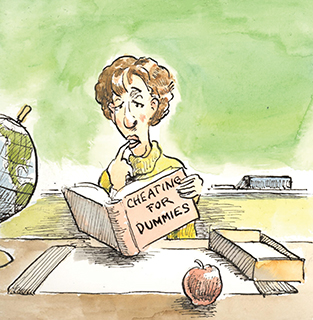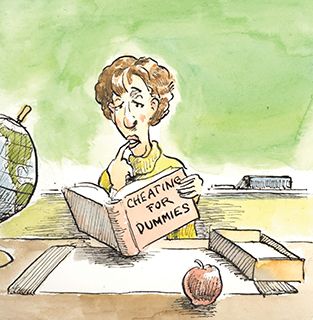

Rundles wrap up: Ethical dunces
Jeff Rundles //May 2, 2013//
 A few weeks back, in April, the Colorado Ethics in Business Alliance (CEBA), of which ColoradoBiz magazine is a co-founder, held its 21st Annual Awards Luncheon honoring Colorado companies, nonprofit organizations and individuals for high ethical standards and practices. When we first came up with the concept, way back in 1990, it was in response to the then-raging Savings and Loan scandal and, of course, in the ensuing years – and in spite of our best efforts to illustrate that you could do well by doing good – there have been tons of further ethical breaches throughout the state and, indeed, the nation.
A few weeks back, in April, the Colorado Ethics in Business Alliance (CEBA), of which ColoradoBiz magazine is a co-founder, held its 21st Annual Awards Luncheon honoring Colorado companies, nonprofit organizations and individuals for high ethical standards and practices. When we first came up with the concept, way back in 1990, it was in response to the then-raging Savings and Loan scandal and, of course, in the ensuing years – and in spite of our best efforts to illustrate that you could do well by doing good – there have been tons of further ethical breaches throughout the state and, indeed, the nation.
The very latest was the indictment of 35 school administrators and teachers in the Atlanta Public Schools on charges of racketeering, theft by taking and making false statements in connection with cheating on test scores for standardized tests that students are required to take. It goes without saying that the reason for the cheating is that educators can and do receive financial bonuses and other professional perks for improving test scores, and these reprehensible actions have been discovered in scores of school districts throughout the country, including Denver.
It’s disgusting, plain and simple. But not altogether surprising.
When I was a kid, one of the platitudes they taught us in school, at home and in church is that, “Cheaters never win, and winners never cheat;” but what you learn if you live long enough – say, to 8th grade – is that cheaters often win, and winners often cheat. I mean, c’mon, in spite of a few PR hassles and wrist slaps, I don’t see guys like Lance Armstrong, Barry Bonds and Joe Nacchio in bread lines – and they are simply among the few who (A) got caught, and (B) were high profile enough to get at least some punishment. There are plenty of other cheats cycling, swinging and board-rooming around in relative luxury to justify, at least for some, the inherent risks, such as they are.
Clearly, however, the list of temptations is huge and often tries even the best of us. We are, after all, human and, therefore, flawed.
So we do our best. We try and catch the wrongdoers and punish them, and we strive to illuminate the good-deed-doers, and hold both camps out as examples of the risks and rewards. It’s a tough business.
But in these educator-cheating scandals I am not so much concerned with right and wrong and what it is doing to our children, although, obviously, it’s a huge concern. What I got thinking about is the education part.
In many of these cases, including the incidents at Beach Court Elementary School and Hallett Fundamental Academy in Denver, it was such bad cheating. Quite often in the span of just three years or so, these “educators” were so blatant they nearly doubled the test score results and used a series of identical correct answers. It wasn’t as if they got caught by highly trained auditors who worked hard to discover clever schemes – any 4th grader could have figured out in a cursory inspection that something nefarious was up, that the “improvements” that led directly to bonuses and perks didn’t pass the smell test.
What this says is that many of the people educating our children are not only cheats, but morons to boot. OK, they have ethical problems that no one would dispute, but they also strike me as people who would add 2+2 and come up with 5 while at the same time they couldn’t place China in Asia, or even read “Dick and Jane” to their classrooms without struggling. It’s not just that they cheated, which is despicable, but that they are obviously also too stupid to be entrusted with something as serious as teaching.
Perhaps our children will learn the moral lessons now that their teachers and principals got fired and are going to jail, but what about the other lessons? Something tells me that with these complete idiots overseeing classrooms, the Three R’s are taking a beating.
Prosecutors and judges should make them wear Dunce Caps and throw the book at them. Not that they could read it.
























